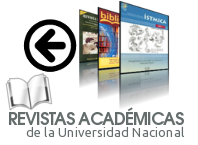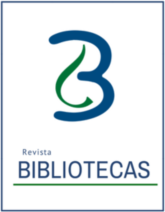Academic Services in Learning Commons of Academic Libraries: An Answer to the Current Educational Requirements
DOI:
https://doi.org/10.15359/rb.39-1.1Keywords:
Learning Commons, Academic services, Virtual Learning Commons, Library Services, Academic libraries, Librarian profile, Information Management, Knowledge ManagementAbstract
Undoubtedly, the library is a service-oriented institution, which has a deep social dimension. This means, among many things, a relationship between society and the library. Because of this, the social group influences the configuration of the information center that affects each of its processes, including its services. The university libraries involved in this kind of dynamics, which is why they have due to educational requirements, making room to Learning Commons (LC) have generated changes in the services they offer to their users. Given this situation, this article proposes the concept of academic services to support the universities, through transversality, gradualness, flexibility, innovation, dynamism, teamwork, co-responsibility and the skills of the librarian.
References
Al-Harrasi, A. y Taha, A. (2019). Networked library access and services delivery for the blind and visually impaired university students: evidence from the UAE. Information discovery and delivery, 47(3), 117-124. https://doi.org/10.1108/IDD-07-2017-0058
Allegheny College. (2020). Subject Consulting / Tutoring. Recuperado de https://sites.allegheny.edu/learningcommons/tutoring/
Allendez-Sullivan, P. M. (2004). El impacto de las nuevas tecnologías en la competencia laboral del bibliotecario del siglo XXI. Biblios, 5(17), 25-35.
Arras-Vota, A. M., Fierro-Murga, L. E., Jáquez-Balderrama, J. L. y López-Díaz, J. C. (2010). Redes de colaboración, estrategia empresarial en la inserción a cadenas de valor. Revista Mexicana de Agronegocios, 26, 215-225.
Bell, S. (2018). Addressing student plagiarism from the library learning commons. Information and Learning Sciences, 119(3/4), 203-214. https://doi.org/10.1108/ILS-10-2017-0105
Bennett, J. Jr. (15 de Julio de 2016). Auburndale Public Library to host reading flash mob. The Ledger. Recuperado de https://www.theledger.com/news/20160715/auburndale-public-library-to-host-reading-flash-mob
Bennett, S. (2015). Putting learning into library planning. Libraries and the academy, 15(2), 215-231. https://doi.org/10.1353/pla.2015.0014
Bowling Green State University. (2020). The writing center. Recuperado de https://www.bgsu.edu/learning-commons/writing.html
British Columbia Institut of Technology. (2020). Peer Tutoring. Recuperado de https://www.bcit.ca/learningcommons/peer/index.shtml.
Burress, R., Atkins, C. y Burns, C. (2018). Learning Commons as a Catalyst for Instructional Partnerships. Teacher Librarian, 45(4), 28-31.
Cherinet, Y. M. (2018). Blended skills and future roles of librarians. Library Management, 39(1/2), 93-105. https://doi.org/10.1108/LM-02-2017-0015
Cohen, S. (2015). Coteaching. Teacher Librarian, 42(5), 8-11.
Cox, J. (2018). Positioning the Academic Library within the Institution: A Literature Review. New Review of Academic Librarianship, 24(3-4), 219-243. https://doi.org/10.1080/13614533.2018.1466342
Daigle, M. (27 de febrero de 2014). Rumford Library to host free yoga class on March 6. Sun Journal. Recuperado de https://www.sunjournal.com/2014/02/27/rumford-library-host-free-yoga-class-march-6/
Department of Education and Early Childhood Development (2018). Extending The Classroom:
The Library Learning Commons. A Curriculum Support Document – 2018. Recuperado de https://www.gov.nl.ca/eecd/files/pdf_extending_the_classroom-the_library_learning_commons_june_15_2018.pdf
Dron, J. y Anderson, T. (2014). Filling the Gaps With a Virtual Learning Commons at an Online University [Ponencia]. European Conference on Social Media, Brighton, Reino Unido. Recuperado de https://books.google.com.mx/books?id=qVQJBAAAQBAJ&lpg=PA144&ots=WKlTWccIwZ&dq=%22Filling%20the%20Gaps%20With%20a%20Virtual%20Learning%20Commons%20at%20an%20Online%20University%22&hl=es&pg=PA144#v=onepage&q=%22Filling%20the%20Gaps%20With%20a%20Virtual%20Learning%20Commons%20at%20an%20Online%20University%22&f=false
Elliott, C. R., Vandenbark, R. T. y TeKippe, S. (2018). An ELITE service model: Creating and implementing a peer-to-peer library tech support team. College & Undergraduate Libraries, 25(2), 110-121. https://doi.org/10.1080/10691316.2018.1441770
Foote, C. (2015). The Librarian--Principal Relationship. Teacher Librarian, 42(4), 27-28.
Gallo-León, J.P. (2015). La biblioteca es servicio (y en ello está nuestro futuro). El profesional de la información, 24(2), 87-93. https://doi.org/10.3145/epi.2015.mar.01
Gardner, B., Napier T. L. y Carpenter R.G. (2013). Reinventing Library Spaces and Services: Harnessing Campus Partnerships to Initiate and Sustain Transformational Change. Advances in Librarianship, 37, 135-151. https://doi.org/10.1108/S0065-2830(2013)0000037010
González-Fernández-Villavicencio, N. (2016). El bibliotecario-docente-universitario es un 'sin papeles'. Anuario ThinkEPI, 10, 60-67. http://dx.doi.org/10.3145/thinkepi.2016.06
Hanemann, U. y Krolak, L. (eds.). (2017). Fostering a culture of reading and writing: examples of dynamic literate environments. Hamburg: UNESCO Institute for lifelong learning. Recuperado de https://unesdoc.unesco.org/ark:/48223/pf0000257933
Harris, S. (2016). Distinctive services in academic librarianship. New Library World, 117(9/10), 596-625. https://doi-org.pbidi.unam.mx:2443/10.1108/NLW-05-2016-0036
Higgins, E., Dexter, P., Nutty, D. y Grubb, W. (s.f.). LEARNING COMMONS: A Dynamic and Collaborative Environment of Student Learning and Academic Support. Recuperado de http://docplayer.net/20815591-Learning-commons-a-dynamic-and-collaborative-environment-of-student-learning-and-academic-support.html
Hubbard, M. A. y Loos, A. T. (2013). Academic library participation in recruitment and retention initiatives. Reference Services Review, 41(2), 157-181. https://doi.org/10.1108/00907321311326183
Independt Group of Scientists appointed by the Secretary General. (2019). Global Sustainable Development Report 2019: The Future is Now – Science for Achieving Sustainable Development. New York: United Nations.
Ingram, C. (2018). “Doga” brings yoga with dogs to library. High Point Enterprise. Recuperado de https://hpenews.com/news/135/doga-brings-yoga-with-dogs-to-library/
Intzidis, E. y Karantzola, E. (2008). Literacies for active citizenship. En Literacy and the promotion of citizenship: discourses and effective practices (7-12). Hamburg: UNESCO Institute for lifelong learning, 2008.
Johnson, K. (2016). Bridging Two Worlds. Teacher Librarian, 43(3), 19-23.
Keith, K. J. 2015. Three Heads Are Better Than One. Teacher librarian, 42(5), 12-18.
Keyes, K. (2017). Welcoming spaces: Supporting parenting students at the Academic Library. The Journal of Academic Librarianship, 43(4), 319-328. https://doi.org/10.1016/j.acalib.2017.06.001
Knapp, J. A., Rowland, N. J. y Charles, E. P. (2014). Retaining students by embedding librarians into undergraduate research experiences. Reference Services Review, 42(1), 129-147. https://doi.org/10.1108/RSR-02-2013-0012
Knight, J. A. (2017). Academic librarians as change champions: a framework for managing change. Library Management, 38(6/7), 294-301. https://doi.org/10.1108/LM-03-2017-0031
Knight, L., Hight, M. y Polfer, L. (2010). Rethinking the library for the international student community. Reference Service Review, 38(4), 581-605. https://doi.org/10.1108/00907321011090746
Koechling, C. (2015). Be a Learning Leader @ Your Library Learning Commons. Teacher Librarian, 22(3), 30-32.
Kompar, F. (2015). Re-imagining the school library. Teacher Librarian, 42(4), 20-24.
Kompar, F. (2018). Every year is the year of the Learning Commons: A Challenge--Become a Showcase Learning Commons School or District. Teacher Librarian, 46(2), 58-61.
Labra, O. (2013). Positivismo y Constructivismo: Un análisis para la investigación social. RUMBOS TS, (7), 12-21. Recuperado de http://revistafacso.ucentral.cl/index.php/rumbos/article/view/135/131
Lai, K. (2015). A roadshow of library resources: familiarize students with what you have. Reference Services Review, 43(2), 280-291. https://doi.org/10.1108/RSR-11-2014-0053
Lampert, L. D. y Meyers-Martin, C. (2019). Creating a learning commons: a practical guide for librarians. Lanham: Rowman & Littlefield.
Lenoir-Rhyne University. (2020). Lohr Learning Commons. Recuperado de https://www.lr.edu/student-life/lohr-learning-commons
Lenstra, N. (2018). The Role of Public Librarians in Supporting Physical Activity. En Challenging the “Jacks of All Trades but Masters of None” Librarian Syndrome (Advances in Library Administration and Organization, Vol. 39) (185-205). Emerald Publishing Limited. https://doi.org/10.1108/S0732-067120180000039012
Loertscher, D. V. y Koechlin, C. (2015). Coteaching and the Learning Commons. Teacher Librarian, 43(2), 12-16.
Loertscher, D. V. y Zepnik, J. (2019). Coteaching Revisited: The Replication Study. Teacher Librarian, 47(1), 40-47.
Mark, D. (2019). Strong Leadership Builds Libraries: The Vital Role of Administrators in the School Library Learning Commons. Canadian School Libraries Journal, 15.
McDaniel, S. (2018). Library roles in advancing graduate peer-tutor agency and integrated academic literacies. Reference Service Review, 46(2), 272-293. https://doi.org/10.1108/RSR-02-2018-0017
Morales-López, V. (2018). Evolución del concepto producto y servicio en la biblioteca: organización orientada al servicio e intensiva en conocimiento. e-Ciencias de la Información, 8(2), 3-19. https://doi.org/10.15517/eci.v8i2.30933
Moreillon, J. (2017). The Learning Commons. Teacher Librarian, 44(3), 21-25.
Narváez-Rivero, M. y Prada-Mendoza, A. (2005). Aprendizaje Autodirigido y desempeño académico. Tiempo de educar, 2005, 6(11), 115-146.
Niño-González, J. I., Barquero-Cabrero, M. y García-García, E. (2017). Opinión pública e infoxicación en las redes: Los fundamentos de la post-verdad. Vivat Academia, (139). https://doi.org/10.15178/va.2017.139.83-94
Oficina de Ciencias de la UNESCO para América Latina. (1972). La matemática y la educación. Montevideo: Oficina de ciencias de la UNESCO para América Latina.
Oliveira, S. M. (2017). The academic library’s role in student retention: a review of the literature. Library Review, 66(4/5), 310-329. https://doi.org/10.1108/LR-12-2016-0102
Organización de las Naciones Unidas para la Educación, la Ciencia y la Cultura. (2015). Replantear la educación: ¿Hacia un bien común mundial? París: Organización de las Naciones Unidas para la Educación, la Ciencia y la Cultura.
Organisation for Economic Co-operation and Development. (2006). Assessing Scientific, Reading and Mathematical Literacy: A Framework for PISA 2006. París: PISA; OECD Publishing.
Organisation for Economic Co-operation and Development. (2011). Preventing and Reducing Armed Violence in Urban Areas: Programming Note, Conflict and Fragility. Paris: OECD Publishing. http://dx.doi.org/10.1787/9789264107199-en
Organisation for Economic Co-operation and Development. (2015). Gender equality. Trends Shaping Education Spotlights, (7). https://doi-org.pbidi.unam.mx:2443/10.1787/ea1ec35f-en
Organisation for Economic Co-operation and Development. (2019a). Artificial Intelligence in Society. París: OECD Publishing. https://doi.org/10.1787/eedfee77-en
Organisation for Economic Co-operation and Development. (2019b). PISA 2018 Results (Volume III): What School Life Means for Students’ Lives. París: PISA; OECD Publishing, 2019b. https://doi.org/10.1787/acd78851-en
Palomino, N. E. y Ferreira-Gouveia, P. (2011). Righting the academic paper: A collaboration between library services and the writing centre in a Canadian academic setting. New Library World, 112(3/4), 131-140. https://doi.org/10.1108/03074801111117032
Pardo-Rodríguez, L. E., Romero-Otero, I. S. y Rodríguez-Sánchez, P. J. (2018). El accionar de la Biblioteca Pública en un ecosistema de emprendimiento e innovación En Experiencias y percepciones de las bibliotecas ante el desafío del desarrollo sostenible (41-71). México: UNAM, Instituto de Investigaciones Bibliotecológicas y de la Información.
Rincón-Muñoz, C. I., Stolle-Arranz, A. y Rodríguez-Sumaza, C. (2014). El potencial de la corresponsabilidad en el ámbito universitario: una experiencia de trabajo colaborativo desde la biblioteca para la formación en la prevención de la violencia de género. Anales de Documentación, 17(2), 1-15. https://doi.org/10.6018/analesdoc.17.2.200211
Ríos-Ortega, J. (2018). Presentación. En Experiencias y percepciones de las bibliotecas ante el desafío del desarrollo sostenible (IX-XIII). México: UNAM, Instituto de Investigaciones Bibliotecológicas y de la Información.
Rodríguez-Castro, H. (1995). Sobre el papel del bibliotecólogo. Bibliotecas, 1995, XIII (1).
Roots-Lewis, K. (2016). The school librarian and leadership. What can be learned? Teacher librarian, 43(4), 18-21.
Sanabria-Rangel, P. E., Morales-Rubiano, M. E., Ortiz-Riaga, C. (2015). Interacción universidad y entorno: marco para el emprendimiento. Educación y educadores, 18(1), 111-134. http://dx.doi.org/10.5294/edu.2015.18.1.7
Sánchez-García, S. y Yubero, S. (2015). Función social de las bibliotecas públicas: nuevos espacios de aprendizaje y de inserción social. El profesional de la información, 24(2), 103-111. https://doi.org/10.3145/epi.2015.mar.03
Seattle University. (2020) Math Lab. Recuperado de https://www.seattleu.edu/scieng/math/student-resources/math-lab/
Sierra-Pérez, J. H. (2005). Aprendizaje autónomo: eje articulador de la educación virtual. Revista Virtual Universidad Católica del Norte, (14).
Strange, T. y Bayley, A. (2008). Sustainable Development: Linking economy, society, environment. París: OECD Publishing. https://doi.org/10.1787/9789264055742-en
Tallahassee Community College. (2020). Success coaching. https://www.tcc.fl.edu/academics/academic-divisions/learning-commons/success-coaching-/
Trinity Western University. (2020). Success Coaching. Recuperado de https://create.twu.ca/learningcommons/academic-coaching/
University of Central Missouri. (2020). Writing center. Recuperado de https://www.ucmo.edu/offices/learning-commons/writing-center//
University of Miami Libraries. (2020). Learning Commons Workshops. Recuperado de https://www.library.miami.edu/learningcommons/workshops.html
University of Nebraska at Kearney. (2020). Success Coaching. Recuperado de http://www.unk.edu/offices/learning_commons/success-coaching.php
University of Southern Maine. (2020). Writing assistants. Recuperado de https://usm.maine.edu/learningcommons/writing-assistants/
University of Victoria. (2020). Physics Help. Recuperado de https://www.uvic.ca/library/locations/home/learning/physics.php
Math and Statistics Help. (s.f.). Recuperado de https://www.uvic.ca/library/locations/home/learning/math.php
Viaña, J. (2009). Teoría crítica o positivismo en la práctica pedagógica. Revista Integra Educativa, 2(1), 109-123.
Walter, S. (2018). Communicating value through strategic engagement: Promoting awareness of the “value of libraries” through alignment across academic, student, and administrative affairs. Library Management, 39(3/4), 154-165. https://doi.org/10.1108/LM-09-2017-0093
Warwick, C., Terras, M., Galina, I., Huntington, P. y Pappa, N. (2008). Library and information resources and users of digital resources in the humanities. Program: electronic library and information systems, 42(1), 5-27. https://doi.org/10.1108/00330330810851555
Wexelbaum, R. S. (2018). Do libraries save LGBT students? Library Management, 39, (1/2), 31-58. https://doi.org/10.1108/LM-02-2017-0014
Zhang, Y., Liu, S. y Mathews, E. (2015). Convergence of digital humanities and digital libraries. Library management, 36(4/5), 362-377. https://doi.org/10.1108/LM-09-2014-0116
Downloads
Published
How to Cite
Issue
Section
License
Bibliotecas provide immediate open access to their content, based on the principle of facilitating research to the public free of charge and free of charge to promote the global exchange of knowledge.
The journal Bibliotecas is a publication hosted by a public higher education institution, which is supported by public resources. Since its inception, the magazine has offered all its contents free of charge without any restriction on the rights of: reading, downloading and printing in full text. Works published in libraries may be analyzed, quoted and reproduced in whole or in part, mentioning the original source.
The journal Bibliotecas is licensed under the Creative Commons Attribution - Non-Commercial - Share Equal, 4.0 International license; therefore, it is allowed to: share, copy and redistribute the material in any medium or format.

Este obra está bajo una licencia Creative Commons Atribución-NoComercial-CompartirIgual 4.0 Internacional.








